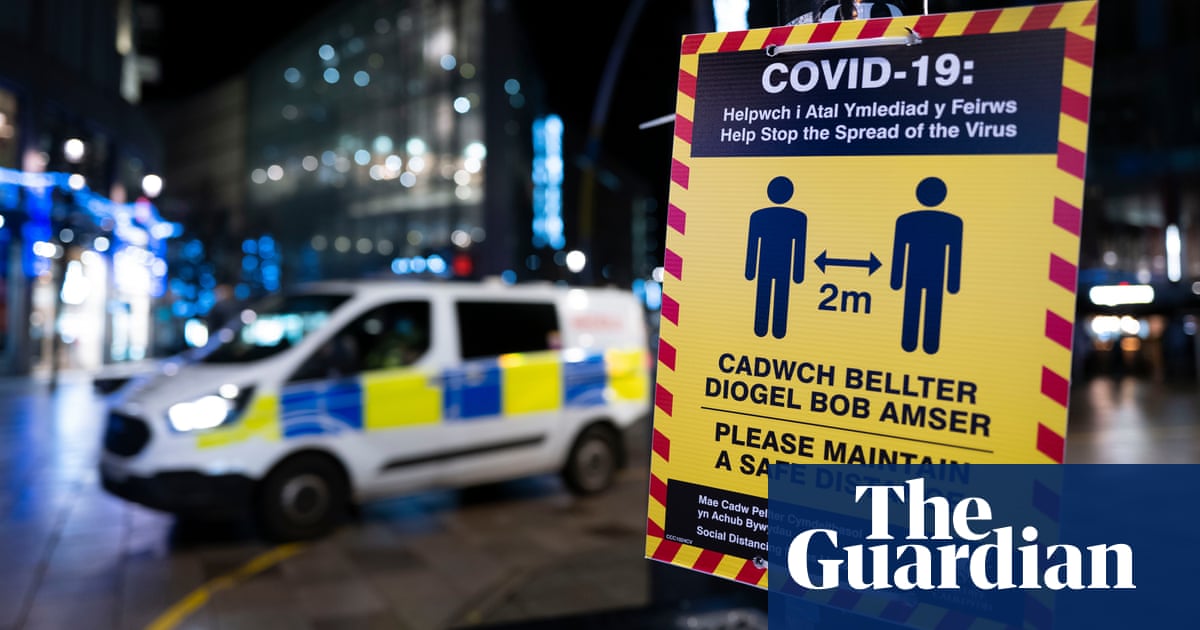The Welsh government’s cabinet did not discuss the threat posed by Covid as the virus spread across the world until a month after its chief medical officer had warned there was a “significant risk” it would reach Wales, the inquiry into the pandemic has heard.
At the start of three weeks of hearings in Cardiff, the inquiry was told this was more than three weeks after the UK government’s cabinet debated Covid, with bereaved families describing this delay as a missed chance to “armour up for battle”.
The Labour-led government was also accused of “a massive failure of infection control” when it allowed patients to be discharged from hospitals into care homes without being tested. It was suggested that first minister Mark Drakeford’s administration should have banned mass gatherings sooner.
The Welsh leg of the UK Covid inquiry began with a moving film in which families described losing relatives to the virus and survivors revealed how it had affected them. One told how her husband had begged her not to take him to hospital because he would be infected. Others recalled how loved ones had died trapped in Covid wards, separated from families.
A person with disabilities told how his mental health had been affected because he felt he was being “kept in prison” during lockdowns. Others expressed distress that they had not been able to organise proper funerals.
Tom Poole KC, counsel for the inquiry, said the number of Covid deaths in Wales was more than 12,300. “That is by any measure a shocking figure and a terrible loss of life,” he said.
Poole said people from deprived backgrounds, people from ethnic minorities or with disabilities, older people and women in Wales had been disproportionately affected by Covid.
Detailing the chronology of the pandemic, Poole said on 24 January 2020 the Welsh government was warned by its chief medical officer, Frank Atherton, that there was a “significant risk” Covid would reach Wales. The UK cabinet discussed it on 31 January but the Welsh cabinet did not do so until 25 February.
Poole said: “Does the fact that Covid was not discussed by the Welsh cabinet throughout January indicate that the threat posed by the virus was not taken as seriously as it ought to have been or that the Welsh government thought the UK government had things under control and there was no need to take independent action? Was there a lack of national strategic leadership and co-ordination from the Welsh government in this crucial early period?”
He pointed out that Welsh Labour called off its spring 2020 conference but was still prepared to allow 70,000 people to gather in Cardiff for a Wales v Scotland rugby game on 14 March. The game was eventually cancelled by the Welsh Rugby Union but not until 20,000 Scottish rugby fans had arrived in the Welsh capital. He also pointed out that two concerts by the Welsh band Stereophonics also went ahead.
Poole said: “Gatherings were not without some risk and a ban would have reinforced other social distancing good practice.”
The barrister said more than 1,000 Welsh patients were discharged from hospital to care homes without a test during March and April 2020. He said: “There is no doubt there has been a massive failure of infection control contributed at least in part to the influx of infected but untested patients.”
Later in the pandemic, the Welsh government imposed different restrictions to England. Poole said: “We will examine the extent to which divergence was based on proper advice … whether points of difference were substantive or merely cosmetic.”
The issue of politicians’ WhatsApp messages disappearing has cropped up during the inquiry. Poole said text or WhatsApp messages from ministers “shed light” on some key decisions. He said there were instances when informal communications from Welsh politicians had been deleted and said: “The inquiry will wish to know why and how such messages are now not available for inspection.”
Nia Gowman, a barrister for the Covid-19 Bereaved Families for Justice Cymru group, told the inquiry that the then Welsh health minister – and now first minister candidate – Vaughan Gething and a senior adviser to Drakeford used the disappearing messages function on WhatsApp during the pandemic.







